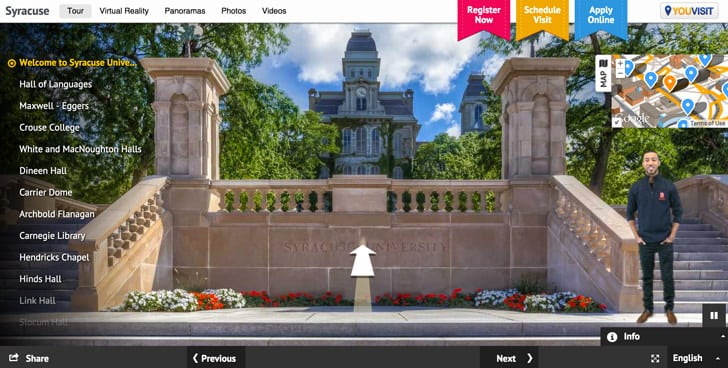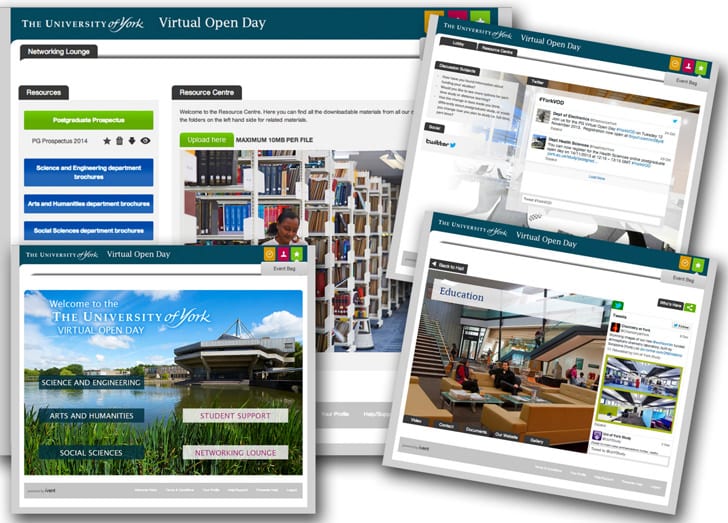Virtual tours growing in popularity
Why do international students choose a certain university or school? Major factors are word-of-mouth and an institution’s prestige - influential especially for the many students who aren’t able to visit a campus before applying. These students tend to have more contact with schools with generous marketing budgets and so greater international reach and visibility. But a new digital marketing technique is helping to level the competitive field with respect to international recruitment: the virtual campus tour. This ICEF Monitor article looks at the trend and how universities are using virtual campus tours to help convert prospective students into enrollees.
Opening the playing field
Endri Tolka, an Albanian graduate of Brandeis University, recalls that he chose his university because his older brother had gone there. He went there without having visited any schools, including Brandeis, because he simply couldn’t. Mr Tolka’s experience is far from unusual for international students, and it also gave him the germ of the idea for the business he would create: YouVisit, a company for which he is CEO. When we last wrote about YouVisit in September 2012, the company had a base of 150 client-schools. Two-and-a-half years later, it now works with more than 1,000 universities around the world to create virtual campus tours. The University of Kentucky is a YouVisit client and spokesman Jay Blanton explains the problem that YouVisit solves:
"[Virtual campus tours] are increasingly a tool utilised by leading universities in their recruitment efforts. We know from our research that if students come to campus for a visit, they are more likely to enroll. That's not possible for a lot of students, or you may have an issue where students are deciding which campuses to tour."

Reach more students, at any time
YouVisit is just one of the companies now helping schools in various countries to recruit students via digital, virtual experiences. UK-based Ivent, which specialises in “virtual events,” is another, as is the US-based platform CollegeWeekLive which offers live web chats and virtual college fairs. Most such sites also offer a ready portfolio of existing tours and virtual events that you can review for inspiration and ideas. Ivent director Gavin Newman penned a guest article recently in University World News in which he explained the benefits of virtual events such as “open days” aimed at international students. Here, he points to the advantage of a virtual vs. a physical open day:
“Instead of just delivering an event on a single day to only those people able to attend, institutions using the Ivent event platform now have the ability to run subject and course-specific live chat discussions with students from across the world on any given day.”

After a virtual open day, a university might use it (i.e., the information and contacts it generated) to launch a host of complementary virtual follow-up initiatives, all designed to inch students along the path to enrolment:
- Live-chat discussions;
- Visa and accommodation information sessions;
- Events with students who have received offers but not yet enrolled;
- Parent-only mini-events;
- Virtual lectures prospective students can sit in on;
- Sessions in which faculty can answer questions from students and their families;
- And sessions that connect far-off prospective students with alumni to ask questions.
Essentially, the initial virtual event can pave the way for ongoing dialogue with students, virtual or otherwise. Such events can provide students with a much richer experience than a website or print brochure. They may not be as tactile or immersive as a physical campus visit would be, but they have several key advantages. They can:
- Reach real student prospects who cannot travel to a campus;
- Reach many students in a target market, and many students in several target markets;
- Reach all these students via a single tour or event.
They can do all of this repeatedly (i.e., students can take a virtual tour as many times as they like), at any time (24/7) and are ready-made for sharing - as students can easily pass tour links to other students, to their parents, to their teachers, etc.
Students want to see where they are going
There is evidence that students are beginning to see schools’ provision of virtual experiences as essential. The college search website Cappex released a report in 2012 that revealed virtual tours to be the top tool students used to initially evaluate a campus. 36% of students said they would “really like” for colleges to offer virtual tours as a way of introducing them to the school campus, and 30% called them a “must have.” And that was 2012 - students’ expectations for the provision of virtual tours can only have grown since then as more institutions have introduced expanded options for virtual visits.
A competitive edge for smaller schools and destinations
In some countries, there is a limited set of international educational brands that can pay for the most talented, high-achieving students to come visit their campuses. They know how compelling these visits can be, and by making it possible for top students to visit, they are better able to attract them. But now, as Ivent’s Mr Newman said, “smaller schools potentially have more to gain from online [virtual events] as they can compete with larger institutions without the financial constraints of staging large, resource intensive live events.” These smaller schools can be frustrated in their offline marketing efforts due to larger brands’ established presence and reputation in their target markets, and online strategies can help them break through to prospective students they otherwise would have trouble reaching. For example, Royal Roads University ran a 2014 campaign that let prospective students virtually attend lectures, tour the campus, and participate in Q&A sessions with professors in real time. Royal Roads students served as tour guides - tour guides equipped with Google Glass (a product since discontinued) and a GoPro video camera. They attended lectures and walked around the campus while live streaming their activities. It was all recorded, and you can view the results here. The campaign’s initiator, Catherine Riggins, director of branding, marketing, and recruitment at Royal Roads, said the university’s decision to offer a virtual experience was prompted in part by past marketing campaigns that hadn’t yielded enough conversions. Virtually attending a lecture on Rhetoric in Theory and Practice at Royal Roads Interestingly, the virtual tour and events were enabled by the university’s possession and smart leveraging of data. Ms Riggins told University Affairs that “the university had contact information in its database for many prospective students who had requested information about Royal Roads … and that it began looking for ways to leverage the data and give those potential recruits a sampling of what their education could be like here and how beautiful the campus is.” Ms Riggins also noted that a key benefit of digital marketing – the ability to track user visits and behaviour – was inherent in Royal Roads’ virtual experience campaign.
Content still key
When it comes to online events, such as live Q&A sessions or moderated panels, Mr Newman notes that “the challenges are rarely technical and are based more in the development and availability of relevant and engaging content, specifically video-based content which is key to an online event.” He says that other challenges, such as “how to respond to multiple people on a chat in a single space, how to control a conversation online, steering event attendees to the correct space and content, and managing support issues” are items that can be handled by any good virtual event company. Finally, in this age of integrated marketing, it’s important to remember the excellent opportunities that exist to link virtual tours with SEO, social media, admissions/prospect management, and other elements of an overall recruitment effort.
Most Recent
-
ICEF Podcast: Together for transparency – Building global standards for ethical international student recruitment Read More
-
New analysis sounds a note of caution for UK immigration reforms Read More
-
The number of students in higher education abroad has more than tripled since the turn of the century Read More
















